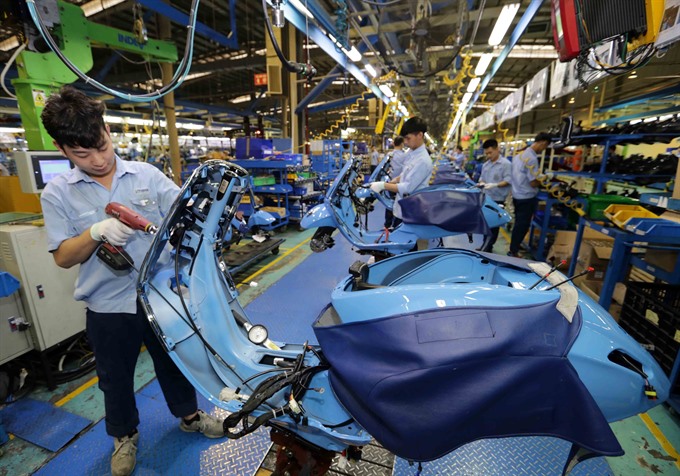The Vietnamese motorcycle market in 2018 broke its sales record set seven years ago with nearly 3.4 million units sold for a year-on-year increase of 3.5 per cent.

The Vietnamese motorcycle market in 2018 broke its sales record set seven years ago with nearly 3.4 million units sold for a year-on-year increase of 3.5 per cent.
According to the Vietnam Association of Motorcycle Manufacturers (VAMM), its five members – Honda, Piaggio, Suzuki, SYM and Yamaha – sold more than 282,000 vehicles per month on average.
This consumption figure is only for the Vietnamese market. VAMM does not disclose the export vehicle sales of its members.
Honda is currently manufacturing and distributing 24 motorcycle models, accounting for more than 70 per cent of the market share nationwide. The remaining market share belongs to Yamaha’s 12 models, Piaggio’s 12 models, Suzuki’s 13 models and SYM’s 19 models.
The products range from affordable to high-end and luxury motorcycles, including manual models, scooters and sports motorcycles with prices listed from tens of million dong to more than one billion.
With this wide variety of products, motorbike manufacturers cover every market sector and provide customers a range of choices.
The motorcycle market also includes other enterprises such as Ducati, Kawasaki, BMW, KTM, Benelli, Peugeot and Harley-Davidson. They were recently joined by VinFast electric motorbikes. However, there are not yet sales figures from these firms.
In a conference held in Ha Noi in 2017, Chairman of VAMM Yano Takeshi said the Vietnamese motorcycle market had become saturated, and was shifting from manual motorcycles to scooters. Scooters accounted for more than 45 per cent of sales and should be a strong growth segment in the future as per capita income increases.
In the view of insiders, along stable economic growth, the incomes of Vietnamese people are increasing, leading to increased demand for new vehicles despite the Government’s policy of restricting motorcycles in large urban areas.
In urban areas with narrow streets and long alleys, public transportation meets a very small portion of travel demand. Experts said this deficiency means motorcycles will remain an essential means of transportation because their flexibility and convenience make them suitable for the road conditions of Viet Nam.
Prices up
The Vietnamese motorbike market has become more active as Tet (Lunar New Year) approaches. This time of year, many customers rush to buy new vehicles. Many dealers have increased their prices by several million to tens of millions of dong per unit over the manufacturers’ listed prices for popular models like the Honda Vision, SH, Lead and Yamaha Exciter.
Sales consultants of Honda and Yamaha dealers said they could not follow the suggested prices because they had to pay additional costs for shipping, ground rental and staff salaries. In particular, the dealers had to raise the prices of some popular models to compensate for slow-selling units, which have seen prices reduced.
Pham Tran Hiep in Ha Noi’s Nam Tu Liem District said: “If I do not need something urgently, I often wait until sale season to purchase. For example, in summer I will buy blankets while in winter I will buy fans or air conditioners.”
“When you come to the store at that time, customers are rare so they are given discounted prices,” said Hiep. “The prices are always cheaper. There is no need to buy products, including motorcycles, in a special time like Tet.”
Explaining the fact that some dealers have increased their prices, General Director of Honda Vietnam Toshio Kuwahara said the situation is the same in a number of countries. For all scooter models, not only Honda vehicles, many consumers pay higher prices than manufacturers suggest.
He said Honda Vietnam does not support this phenomenon.
Kuwahara said Viet Nam’s Competition Law states that motorcycle manufacturers cannot fix prices for distributors, trading companies and sales companies. Honda Vietnam and its agents – as well as Honda Ending Authorised Dealers (Head) – are independent legal entities involved in a partnership. The company has asked its authorised dealers not to sell motorcycles at inflated prices, but it has no right to force them to apply its pricing, he said.
A survey made by Honda Vietnam showed that, besides the increased shopping activity surrounding Tet, the higher prices are partly due to the imbalance between supply and demand. When there is insufficient supply, consumers will pay higher prices.
In an effort to change the situation, Honda Vietnam has been producing scooters at full capacity. The company has also expanded its factory in the northern province of Ha Nam to increase capacity by 10 per cent to raise supply and bring prices in line with the manufacturer’s suggestions. — VNS





